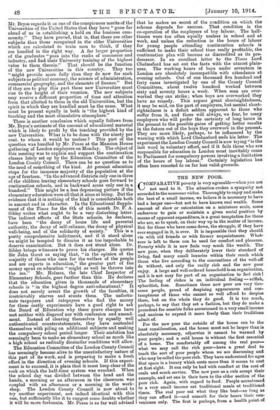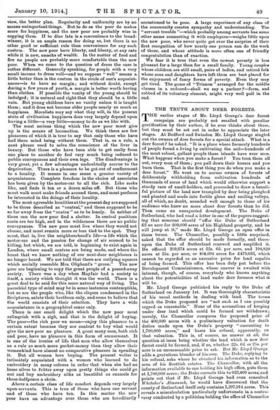THE NEW POOR.
COMPARATIVE poverty is very agreeable—when you are not used to it. The situation evokes a sympathy not accorded to the nouveaux riches. Thoroughly to enjoy and make, the best of a small income, we believe it is necessary to have had a larger one—but not to have known real wealth. Some amount of show or ostentation on a miniature scale, some endeavoar to gain or maintain a given social position by means of apparent expenditure, is a great temptation for those who are, so to speak, on their way up in the matter of income. But for those who have come down, the straggle, if they have ever engaged in it, is over. It is impossible that they should vie with old friends or with former acquaintances. What- ever is left to them can be used for comfort and pleasure. Poverty while it is new feels very much like wealth. The new poor, when they deliberately lower their standard of living, find many small luxuries within their reach which those who live according to the conventions of the well-off do without, and only the really rich and the new poor enjoy. A large and well-ordered household is an organization, and it is not easy for part of an organization to feel rich The feeling of riches is an individual feeling — selfish, eybaritish, free. Sometimes these new poor are very tire- some people, proud of despising appearances and con- temptuous of those who cannot so well afford to despise them, but on the whole they do good. It is too much, perhaps, to say that they set a fashion, but they do make a precedent for sensible folks accustomed to a very small income and anxious to expend it more freely than their traditions admit of.
For the new poor the outside of the house can be the least consideration, and the house must not be larger than is absolutely necessary, otherwise it cannot be warmed by poor people ; and a cold house is without the first essential of a home. The comfortably off among the real poor what we may call the rich poor—have a great deal to teach the sort of poor people whom we are discussing and who may be called the poor rich. They have understood for ages that space is a luxury which costs more than it seems to cost at first sight. It can only be had with comfort at the cost of coals and much service. The new poor as a rule accept their example, and set one in their turn to the older section of the poor rich. Again, with regard to food. People accustomed to a very small income eat traditional meals at traditional times. The real poor eat what they like best—so long as they can afford it—and consult for their hours their con- venience only. The first is perhaps, from a health point of
view, the better plan. Regularity and uniformity are by no means unimportant things. But to do as the poor do makes more for happiness, and the new poor are probably wise in copying them. If to dine late is a convenience to the bread- winner, it is an ample reason for doing so, but there is no other good or sufficient rule than convenience for any such custom. The new poor have liberty, and liberty, at any rate while it is new, smacks of wealth. In the matter of food and fire no people are probably more comfortable than the new poor. When we come to the question of dress the case is rather different. Generally speaking, for people with a very small income to dress well—and we suppose " well" means a little better than is the custom in the circle of one's acquaint- ances—is to have no margin ; and without doubt, except during a few years of youth, a margin is better worth having than clothes. If possible the vanity of the young should be indulged ; it is natural and right that they should be a little vain. But young children have no vanity unless it is taught them; and it does not become older people nearly so much as happiness. Moralists may say what they will, in the present state of civilization happiness does very largely depend upon Laving a little—a very little—money to do us we like with.
The moat serious thing which the new poor must give up is the means of locomotion. We think there are few pleasures of which it is true to say that only those who have Lad them mind being without them. That is, as a rule, a cant phrase used to salve the conscience of the liver in luxury. But those who have been able to get easily from one place to another do feel very much being reduced to public conveyances and their own lege. The disadvantage is very great, yet a few advantages undoubtedly accrue to the deprivation. There is a pleasure to be got out of confinement to a locality. It means in one sense a greater variety of acquaintance. Complete freedom in the choice of associates Las been given by the motor-car to all the rich. Like seeks like, and finds it ten or a dozen miles off. But those who must walk must make friends around them, and must perforce be interested in the doings of their locality.
The most agreeable localities at the present day are supposed to be those described as "central," and those supposed to be so far away from the "centre " as to be lonely. In neither of these can the new poor find a shelter. In central positions rents are too high, and in the wilderness there are no public conveyances. The new poor must live where they would not choose, and must remain more or less tied to the spot. They must, that is, live the neighbourhood's life—a life which the motor-car and the passion for change of air seemed to be killing, but which, we are told, is beginning to exist again in London, where small centres are being made, and where the boast that we know nothing of our next-door neighbours is no longer heard. We are told that there are outlying squares which socially resemble Mrs. Oliphant's "green." The new poor are beginning to copy the great people of a passed-away society. There was a day when Mayfair had a society to itself, a society which thought it was the world. There is a great deal to be said for this more natural way of living. The parochial type of mind may be in some instances contemptible, but so are the people who, like the cliques condemned in the Scriptures, salute their brethren only, and come to believe that the world consists of their selection. They have a wide acquaintance in a geographical sense only.
. There is one small delight which the new poor must relinquish with a sigh, and that is the delight of buying. The poor—the rich poor we mean—enjoy this pleasure to a certain extent because they are content to buy what would give the new poor no pleasure. A. great many men, both rich and poor, have no pleasure in this form of amusement. It is one of the ironies of life that men who allow themselves as a rule so much more pocket-money than they allow their womenkind have almost no comparative pleasure in spending it. But all women love buying. The present writer is intimately acquainted with a woman who learned to do embroidery in many colours in order that when she had no loose silver to fritter away upon pretty things she could go out and boy embroidery silks as beautiful as enamels for three-halfpence a skein.
Above a certain class of life comfort depends very largely upon servants. This is true of those who have one servant and of those who have ten. In this matter the new poor have an advantage over those who are hereditarily accustomed to be poor. A large experience of any class of the community creates sympathy and understanding. The "servant trouble "—which probably among servants has some other name connecting it with employers—weighs little upon the new poor, who never quite get over the surprise of their first recognition of how nearly one person can do the work of three, and whose attitude is more often one of friendly congratulation than of exaction.
We fear it is true that even the newest poverty is less pleasant for a large than for a small family. Young couples whose children are still small, pairs of ladies, and retired folk whose sons and daughters have left them are beat placed for the enjoyment of fancy forms of poverty. Even they may get tired. The game of "Trianon " arranged for the middle classes in a reduced—shall we say a parlour P—form, and robbed of its voluntary element, might very well pall in the end.







































 Previous page
Previous page